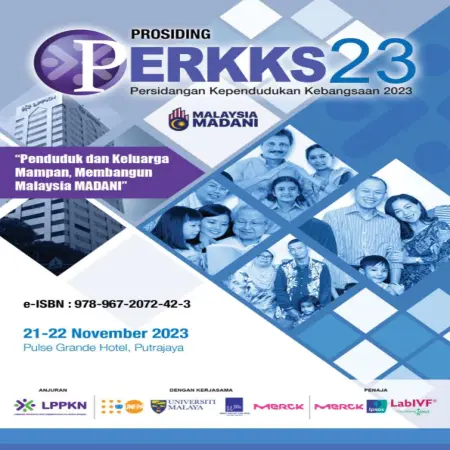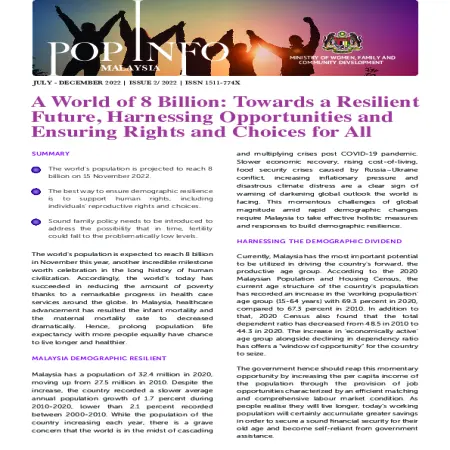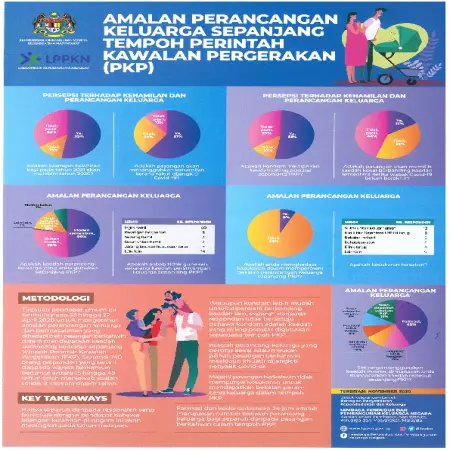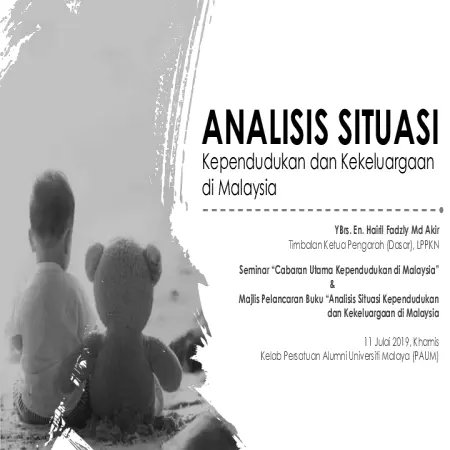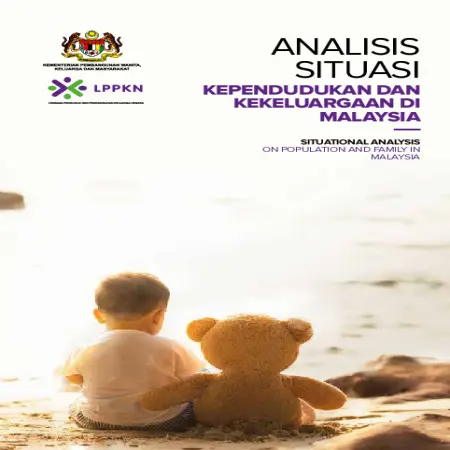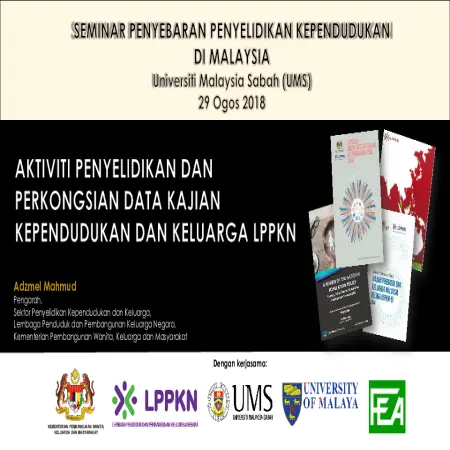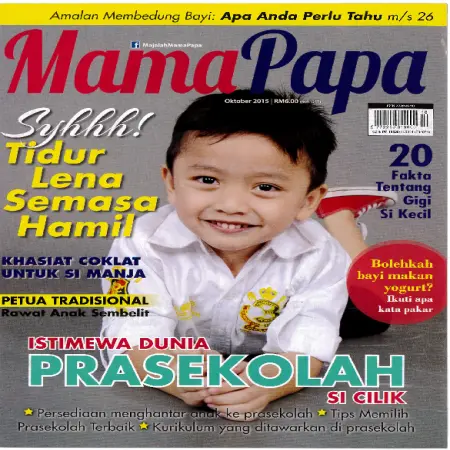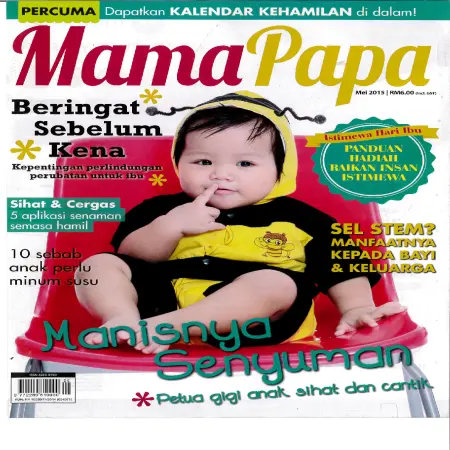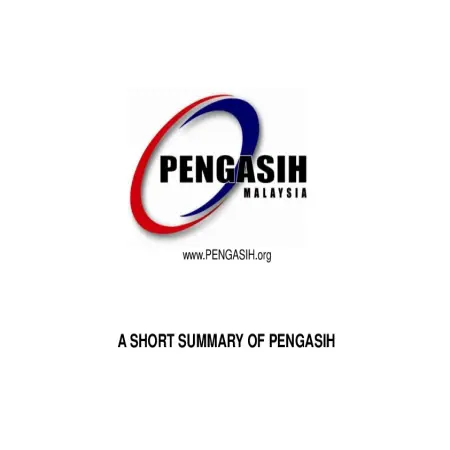TOPICS
Results for Topics : "Family"
|
|
Analisis literatur menangani isu keganasan rumah tangga demi membangun Malaysia Madani
Item Type: Book Section
Editor:
Year: 00/12/2023
Abstract: Domestic violence is one of the branches of the discussion of family counseling issues among counselors in Malaysia. Domestic violence is a social problem that has adverse effects on women and children from physical, psychological and social aspects. This study was conducted to detail the findings of a semi-structured interview with an Information Officer of the Nur Sejahtera Clinic of the National Population and Family Development Board (NPFDB) and an Assistant Officer of the Jabatan Kebajikan Masyarakat Malaysia (JKMM) as well as a literature review related to definitions, propositions / Nas Al-Quran, factors , elements of legislation, intervention, Islamic approach, and measures to overcome the issue of domestic violence.
|
|
|
|
|
|
A world of 8 billion: Towards a resilient future, harnessing opportunities and ensuring rights and choices for all
Item Type: Newsletter
Editor:
Year: 00/11/2022
Abstract: The world's population is projected to reach 8 billion on 15 November 2022. The best way to ensure demographic resilience is to support human rights, including individuals' reproductive rights and choices.
|
|
|
|
|
|
Autonomy in household decision-making among Malaysia women
Item Type: Thesis
Editor:
Year: 00/06/2022
Abstract: The progress of Malaysian women has significantly improved since 1980, particularly in terms of educational achievement. However, women's labor force participation rate, level of women in decision-making at the household and industry levels, is still below that of men. These instances suggested that there were still obstacles to women's empowerment
in Malaysia, particularly in decision-making. Hence, this study aims to identify factors affecting women's autonomy in household decision-making among married women in Malaysia. Data on women's autonomy in household decision-making were obtained from Fifth Malaysian Population and Family Survey in 2014 and accounted for 2595 married women aged 15-59. Kishor's Conceptual Framework and Three-domains of Women's Empowerment were adopted as a research framework. The study framework consisted of ten exogenous factors and endogenous variables of women's autonomy in household decisions. The household decision-making was divided into eight domains: household expenses, buying a house, making assets, family savings, family holidays, children's discipline, children's education, and woman's career. Each household decision domain had responses of three levels of women's autonomy (not involved, joint and sole participation) and was analyzed individually using the Multinomial Logistics Regression method. The study provides evidence that women's characteristics can restrict the
autonomous power of women in a patriarchal society like Malaysia. All selected factors significantly impacted women's autonomy in at least one decision domain in the household. Women's education was the most substantial factor that positively influenced women's autonomy in all decisions in the household. In contrast, the spousal education gap and participation in the labor force could be a barrier to women's autonomy in the household. The family should be at the forefront of the empowering process as a woman's role in caring for the family's welfare is definite. Despite the continuous efforts to empower women, the study suggested that there is a need for a balance in shaping the positive patriarchal values among the communities, particularly among men. This can be achieved by promoting shared responsibility within a household, and this initiative has the same substantial weightage as a woman's education and economic status.
|
|
|
|
|
|
Amalan perancangan keluarga sepanjang tempoh perintah kawalan pergerakan
Item Type: Infographic
Editor:
Year: 00/12/2020
Abstract: A total of 740 respondents of married women aged 15 to 49 years were involved in this public opinion poll to find out family planning practices and problems faced by married couples in obtaining family planning methods during the period of Movement Control Order (MCO).
|
|
|
|
|
|
Analisis Situasi Kependudukan dan Kekeluargaan di Malaysia
Item Type: Conference or Workshop Item
Editor:
Year: 00/00/2019
Abstract: Population related program or policies have been introduced since 1966 and have gone through 3 series of studies. IN 1966, The National Family Planning Program was able to reduce the population growth rate from 3% per year to 2% (1985). On June 10 1966, LPKN was established under The National Family Planning Act No.42, 1966. The growth rate decreased to 2.8 in 1980. The 70 million population policy was announced in 1984 to reach 70 million population by 2100. This presentation slide describes the findings of the study of the analysis of the population and family situation in Malaysia, including the 7 main challenges of the population which include aspects of fertility, aging, labor force and productivity.
|
|
|
|
|
|
Analisis situasi kependudukan dan kekeluargaan di Malaysia
Item Type: Research Report
Editor:
Year: 01/12/2018
Abstract: The evolution of population and family policy in this country has begun since the implementation of the National Family Planning Programme by the National Family Planning Board (NFPB) in 1966. The main purpose of the programme was to reduce the population growth rate from 3% to 2% by 1985. Apart from Malaysia, other Asian countries also introduced
a family planning programme to its population in the 1960s where the earliest country to introduce the programme was India around the 1950s. As a result of the introduction of the family planning programme in the 1960s, the country’s gross birth rate has decreased from 36.7 babies in 1966 to 31.5 babies per 1,000 population in 1985. This directly makes the average annual population growth rate of the country declined from 3.0% per annum in 1966 to 2.8% per annum in 1980.
|
|
|
|
|
|
Antara hak dan tanggungjawab membimbing anak bertanggungjawab
Item Type: Article
Editor:
Year: 00/10/2015
Abstract: Rights can be defined as belonging to each individual while responsibilities are something that must be exercised. Kids who like to take people’s stuff have impulsive traits. Impulsive means someone who has a strong urge to have something. When the desire peaked, he had to get it right away. Some tips are shared to parents when faced with this situation such as encouraging children to ask permission every time they want to borrow items that do not belong to them, explaining to children about the difference between borrowing and taking other people's items without permission and consistent and firm in correcting actions. misconduct of children.
|
|
|
|
|
|
Apa wanita perlu tahu: subur@tidak subur?
Item Type: Article
Editor:
Year: 00/05/2015
Abstract: Fertility is the ability to conceive naturally. As a measure, fertility rate is the number of children born per individual, household or population. Fertility varies according to fertility, i.e. the potential to reproduce (which is influenced by gamete production, fertilization and the ability to conceive long enough). There are several types of ovulation disorders that are 35% of the cause of infertility in women, namely anovulation. Anovulation is a condition where no ovulation process occurs or the egg process is released from the ovaries, oligovulation is an irregular ovulation process that sometimes occurs, sometimes not and the anovulation cycle is a menstrual cycle in which no ovulation process occurs at the cycle.
|
|
|
|
|
|
A short summary of Pengasih
Item Type: Conference or Workshop Item
Editor:
Year: 00/00/2012
Abstract: This paper discuss about a short story summary of PENGASIH. Persatuan PENGASIH Malaysia is registered as an NGO in 1991. Our main activities for the past 22 years are Rumah PENGASIH which is a rehab and treatment centre for recovering addicts using the Peer-Pressure Community System. Seruan Kasih refers a continuous drug intervention and prevention campaign to students, youth and communities. Sidang Kasih is a monthly Family Support Group for family members of recovering users. Teduhan Kasih refers to half-way houses for recovering users to re-enter their mainstream societies by way of work, schooling and training. Finally, Khidmat Kasih is an economic projects towards self-sustenance for PENGASIH and members of PENGASIH.
|
|
|
|





